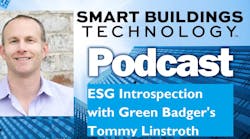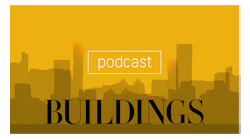For this episode of the Smart Buildings Technology Podcast, we welcome back Green Badger's Tommy Linstroth. As stated in his biography page on the USGBC website: "Tommy Linstroth’s career has spanned the private, academic, and non-profit sectors in the Midwest, West and now East coast, where he is the Principal of Trident Sustainability Group – a triple bottom line consultancy firm and CEO of Green Badger [a provider of ESG LEED sustainability reporting software]."
"To date, Linstroth has personally been involved with over 60 projects achieving LEED certification, with another two dozen underway. These projects include the first building in the Southeast to be both LEED certified and in the National Register of Historic places, the first all-retail LEED shopping center in the nation, the first LEED McDonald’s restaurant, and Sustainable Fellwood, one of the largest green affordable housing developments – part of the LEED for ND pilot program and LEED for Homes program – in the nation."
"Green Badger is the direct output of his experience with LEED. Green Badger provides a mobile solution to LEED construction documentation and allows for easy management of construction waste, sustainable materials tracking, erosion and indoor air quality reporting, and managing low-VOC [volatile organic compounds] products – including a bar code scanner that gives real time VOC information."
"Linstroth founded and chairs Sustainativity, a nonprofit organization utilizing direct philanthropic investments in sustainability to transform communities. He co-chairs the USGBC’s national Value Healthy and Efficient Affordable Housing advocacy campaign, and he is the past chair of the USGBC – Georgia chapter and is the original founder and past-chairman of the USGBC – Savannah Chapter. He is a frequent speaker on green building and sustainability topics throughout the country, and co-authored the book Local Action: The New Paradigm in Climate Change Policy, published in 2007."
For SBT's second sit down with Tommy, we wanted to pinpoint his perspective on a specific set of question related to matters of ESG, i.e. Environmental, Social and Governance, compliance.
Our questions included the following. For contractors and for property owners/managers, what does ESG really mean? How can gathering stats and data on ESG be used to inform change for different types of organizations? What are the most important ESG metrics, and how can they help propel positive outcomes? What is the value of tracking ESG metrics, in terms of asking probing questions that can lead companies to new processes, automations, use-cases, and efficiencies? And finally, what are your predictions for ESG developments this year?
For more news, projects, and profiles in the smart buildings ecosystem, subscribe to the SBT newsletter and follow us on LinkedIn, Twitter, and Facebook.

